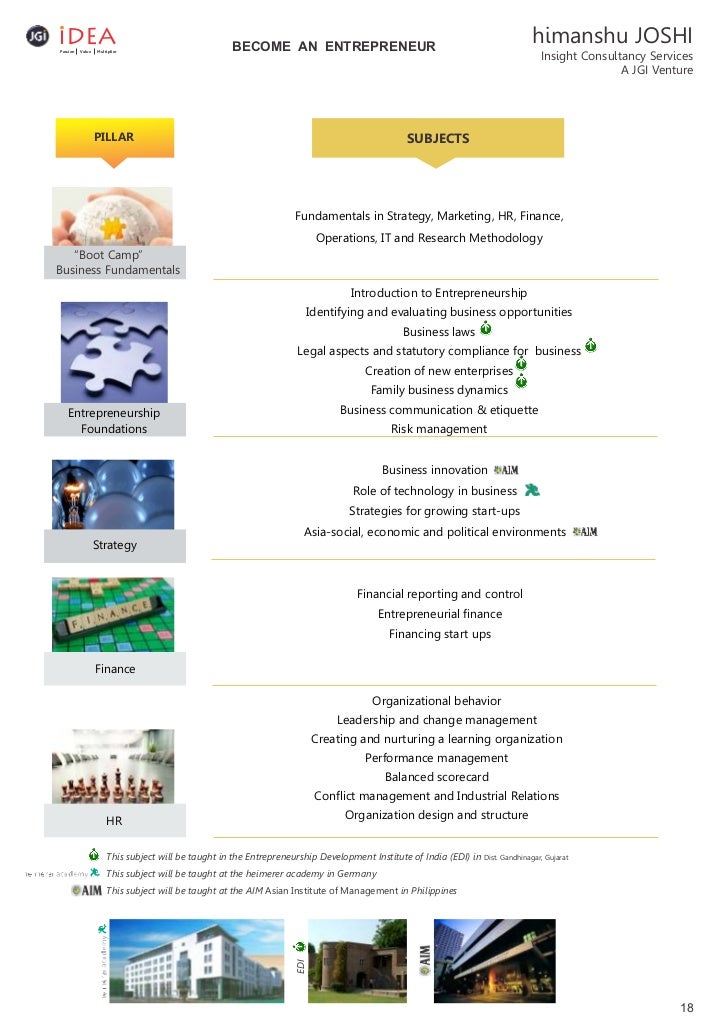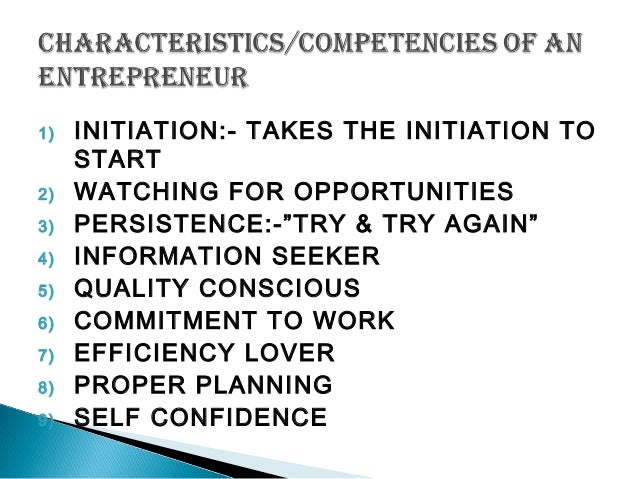What Is The Oppotunities Of Idbi In Enterpreneur Development
Introduction
Tabic VIII: Promotion of Entrepreneurship in BAs and NIDs Source: Operational Statistics IDBI 1985-86. Thus, IDBI, over the years has taken up gigantic. Role of govt in entrepreneurship,role of financial institutions in entrepreneurship,entrepreneurial development programmes,entrepreneural development instituti Slideshare uses cookies to improve functionality and performance, and to provide you with relevant advertising.

Learning Objectives
- Discuss what is meant by entrepreneurship and why it is important to sustainable enterprise.
- Discuss the relationship between innovation and sustainable business.
- Understand the key factors affecting entrepreneurial viability.
- Explain the different motivations for sustainable business entrepreneurs.
- Discuss the main challenges facing entrepreneurs.
Today’s world faces significant challenges. This includes environmental challenges, such as climate disruption caused by man-made greenhouse gas emissions, and societal challenges, including rising income inequality and other forms of social injusticeA situation where there is unfair and unethical treatment of all and not everyone receives a fair share of society’s benefits.. There are several ways that businesses are responding to these challenges. Some organizations are accepting deteriorating environmental, economic, and social conditions and are managing through the decline by adapting to limitations. Other organizations speak to the need to make choices between what is good for the environment and society or doing what is good for the economy. However, there are also more proactive, positive responses, including ones that champion business as a force for positive societal change.
Sidebar
Entrepreneurs Find Solutions to Societal Problems
“Deep down, philosophically, we believe that most problems in society—most environmental problems—exist because business hasn’t made their solutions a priority,” says Gary Hirshberg, founder and CEO of Stonyfield Yogurt. “Our idea is that these problems will go away only if business makes finding solutions a priority.”
Addressing ecological and social concerns can create business opportunities that benefit both the economy and society. This is one of the core philosophies of sustainable business practices and a focus of this textbook. Sustainable businesses can help address society’s concerns while providing profit-making opportunities for business owners.
Sustainable business is in large part about changing business practices. Successful sustainable businesses are focused on the creation of new products, services, or practices that address or mitigate environmental and social concerns in new ways. Success in implementing sustainable business practices relies on entrepreneurshipThe act of starting a new business or revitalizing the business activities of an existing, mature organization. and innovationA change in a product offering, service, business model, or operations that meaningfully improves the experience of a large number of stakeholders..
Entrepreneurship and innovation are relevant in many different sustainable business contexts. They are fundamental for the success of start-up companies that are providing innovative solutions to meet environmental or social challenges. Entrepreneurship and innovation are also highly relevant for established businesses. This applies all the way up to multinational companies, such as General Electric (GE) or Microsoft, and all the way down to small- to medium-sized companies, such as Timberland, Green Mountain Coffee, Oakhurst, and Stonyfield (which are highlighted in cases in this textbook).
Companies undertake sustainability entrepreneurshipThe act of starting a new business or changing an existing business with a specific focus on a new product or service that contributes toward increasing sustainability. for a variety of reasons, including to enhance their brand name and reputation and to benefit financially by being market leaders in business practices that reduce environmental and societal impacts in their sphere of operating influence. They also engage in sustainability entrepreneurship to affect positive societal change.
This chapter provides an overview of entrepreneurship and innovation as it relates to sustainable business and specifically focuses on entrepreneurial innovators who forge new paths and break with accepted ways of doing things in new or existing businesses. The chapter begins by discussing some broader topics related to entrepreneurship and innovation and then relates these concepts in a sustainable business context.
Entrepreneurship – Growth and Development
1. How does entrepreneurship differ from self-employment?
The following are the major differences between entrepreneurship and self-employment with respect to Innovation Scope and Stage.
| BASIC | ENTREPRENEURSHIP | SELF-EMPLOYMENT |
|---|---|---|
| Innovation | Entrepreneurship necessarily involves the task of sensing opportunities and innovating products and services. | Self-employment refers to full time involvement in own occupation in which one may or may not innovate a product or services. |
| Scope | All entrepreneurs are self-employed. | All self-employed persons may not necessarily be entrepreneurs. |
| Stage | Entrepreneurship is the terminal stage of entrepreneurial growth. | Self-employment is the middle stage of entrepeneurial growth. |
| Employment | A lot of employment is generated. | Only self-employment, additional employment may or may not exist. |
| It is a matter of attitude. | It is a matter of habbit. |
2. Why is “income generation” rated as only the initial level of entrepreneurial activity?
Income-generation refers to activities which are often taken up on part time or casual basis and are practiced for the purpose of raising additional-income.
The scope of income generation is very narrow. All income generating persons may or may not be entrepreneurs. However, income-generation will become the initial-stage of entrepreneurial growth when it acts as an encouragement for the person to become self-employed and there by ultimately leading them to entrepreneurship.
Thus we can say rate 'income generation' as only the initial level of entrepreneurial activity.
3. Why are entrepreneurs called creative destroyers of tradition?
Entrepreneurs are called creative destroyers of tradition due to the following factors:
- Entrepreneurship is inextricably linked to innovation and growth. And entrepreneurs are agents of change and they use innovation as a tool.
- They are always looking for an opportunity to offer a better product, a better service, a better process and a better programme. Once they accomplish this the existing product or service or process or programme becomes obsolete.
- Thus they act as creative destroyers of tradition
.
Short Note On Idbi
4. How can we say that every individual is a potential entrepreneur?
Entrepreneurship is defined as the process of using human resource to innovate ideas, products and services and putting them to social use. Since every individual is endowed with a certain resource, we can say that every individual is a potential entrepreneur.
However, due to the fact that not every individual gets an opportunity to fully develop their human resource to realize their potential, we see that there are fewer entrepreneurs in the society than non-entrepreneurs.
5. What steps should the entrepreneur take before launching a venture?
The entrepreneur should take the following steps before launching a venture.
- Acquire indepth economic insight.
- Build the capacity to scan the environment.
- Clearly sense the opportunity.
- Decide to select a venture suitable to the individual entrepreneur.
- Establishing a plan to execute the project.
- Facilitate the assessement and mobilization of the resources.
- Go for the final launch of the entrepreneur
6. How can an entrepreneur raise the expectancy of his success?
Entrepreneurs can raise the expectancy of their success by acquiring the following abilities.
Irrespective of the size of the venture, big or small, they should acquire efficient management of
- Men
- Money
- Material
- Market
Efficiency of these resources is a key factor for the success. However, the required level of expertize in managerial ability in production, marketing, finance and personnel vary as per the size and nature of the enterprise. It also calls for managerial growth and sustenance.
By acquiring these abilities, prospective entrepreneurs can raise the expectancy of their success.
7. How does entrepreneurship development contribute to wealth generation?
- Entrepreneurship involves innovating a better product or a better service or a better process or a better programme.
- This involves efficient mobilization of Men, Material, Money and Market.
- Thus the resources which were lying unutilized will be brought into efficient usage there by contributing to the flow of cash, by opening new markets or increasing the demand in the existing markets.
- This drive to be innovative contributes to the wealth generation process.
8. What factors were responsible for explosion of enterprise activities in India?
The following are the four major factors responsible for enterprise activities in India.
- Globalization : This opened up global markets for both goods and services.
- Availability and fast flow of fund : The availability and accessibility of funds is increased enormously with more and more new financial markets, both indeginously and globally.
- Technology breakthrough : The growth and acceptance of new technology created unlimited entrepreneurial opportunities to meet global demands of goods and sercices.
- Revolution in information technology : Revolution in IT brought in unimaginable speed, low cost, easy access to information. This as opened up various opportunities in IT, telecommunications, entertainment, pharma, healthcare and mindware.
9. Explain the process of entrepreneurship development.
The process of entrepreneurial development consists of creating an entrepreneurial person by
- Imbibing entrepreneurial quality and motivation.
- Developing capacity of sensing, selecting, planning and establishing an enterprise.
- Acquiring ability to successfully manage the set enterprise.
The main methodology can be best classified into simulatory, support services and sustaining. This is best explained through the following diagram.
10. Name the stimulatory activities in the entrepreneurship development cycle.
The following are the simulatory activities in the entrepreneurship development cycle.
- Training and education in entrepreneurship.
- Publicising entrepreneurial opportunities.
- Making available techno-economic information.
- Offering incentives and recognition.
- Creation of forum for entrepreneurs.
- Easy availability of information.
Objectives Of Idbi Pdf
11. Explain the factors that contribute to the creation of an environment conducive to entrepreneurship development
Four major factors that contributed to creation of an environment conducive to entrepreneurship development are.
- Globalization : This opened up global markets for both goods and services.
- Availability and fast flow of fund : The availability and accessibility of funds is increased enormously with more and more new financial markets, both indeginously and globally.
- Technology breakthrough : The growth and acceptance of new technology created unlimited entrepreneurial opportunities to meet global demands of goods and sercices.
- Revolution in information technology : Revolution in IT brought in unimaginable speed, low cost, easy access to information. This as opened up various opportunities in IT, telecommunications, entertainment, pharma, healthcare and mindware.
12. Identify the support services in entrepreneurship development cycle.?
The following are the support services in entrepreneurship development cycle.
- Obtaining funds.
- Getting land, shed and other utilities.
- Acquiring machine and equipment.
- Facilities procuring raw materials.
- Marketing linkages
- Management consultancy
- Providing common facilities
- Technology flow and adoption.
- Availing information.
13. Entrepreneurs should have the ability to scan the environment. Why?

The entrepreneurs should have the ability to scan the environment because of the following reasons.
- They should be able to sense the opportunities that could be turned into potential ventures. This requires a careful observation of their surroundings.
- This gives them the ability to put their efforts in venture into only those innovations which have good marketability.
- This gives them the capability to identify the availability of the resources required to proceed with the venture.
- Scanning the environment helps them to identify the strategies required to efficiently utilize the available resources.
Books & Other Material